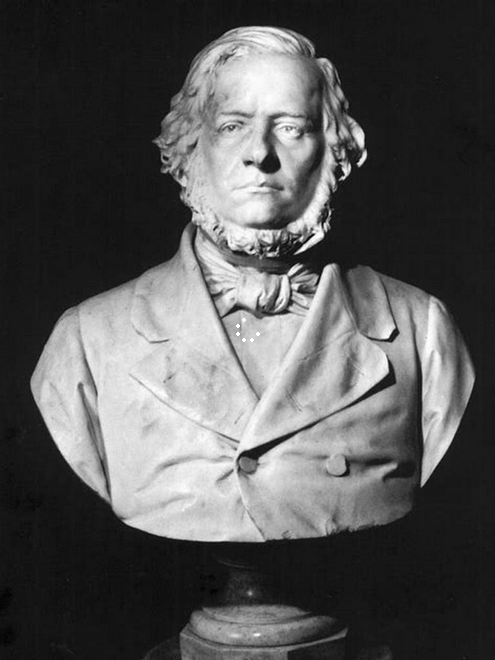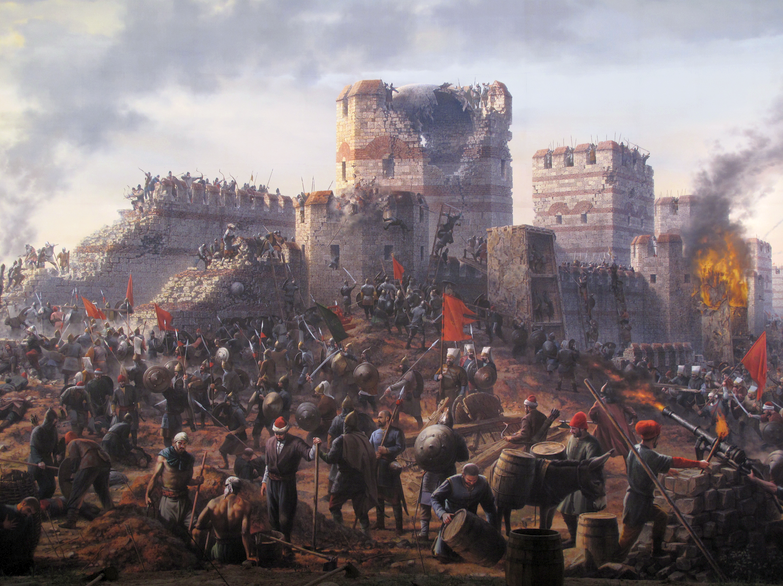Editor’s note: The following is extracted from Builders of United Italy, by Rupert Sargent Holland (published 1908).
The story of Venetian glory seemed closed with the last years of the Eighteenth Century. The proud Queen of the Adriatic had seen her jewels stolen one by one, and had finally become the toy of wanton powers. Venice was no longer self-reliant, no longer coldly virtuous, her grandeur had sunk into a memory, her civic honor been bedimmed by gross corruption. “Venice was,” said the world, and France, parceling out the conquests of the young Napoleon, handed Venetia and the City of the Doges to Austria. There was no opportunity for self-defense, Napoleon had removed all military stores and confiscated the Venetian fleet, the citizens buried the lion-banners of Saint Mark beneath their churches, and silently watched the Austrians enter. The last Doge, aged and bent with years, fell senseless as he opened his lips to swear allegiance to the House of Hapsburg. Europe considered the fate of Venice sealed.
Napoleon came and went, and men as well as maps experienced gigantic changes, but still Venice slept. She had become a part of the Austrian Empire, a new generation grew up who had never known Venice free, who only learned their city’s history by stealth. Among this new generation was Daniel Manin, son of a Jew who had embraced Christianity and who had adopted the surname of his noble patron the last Doge, according to Venetian custom. So it happened that the last free ruler of Venice and the man who was to raise her from sleep bore the same name. There was also transmitted to the boy the ancient hate of Austria.
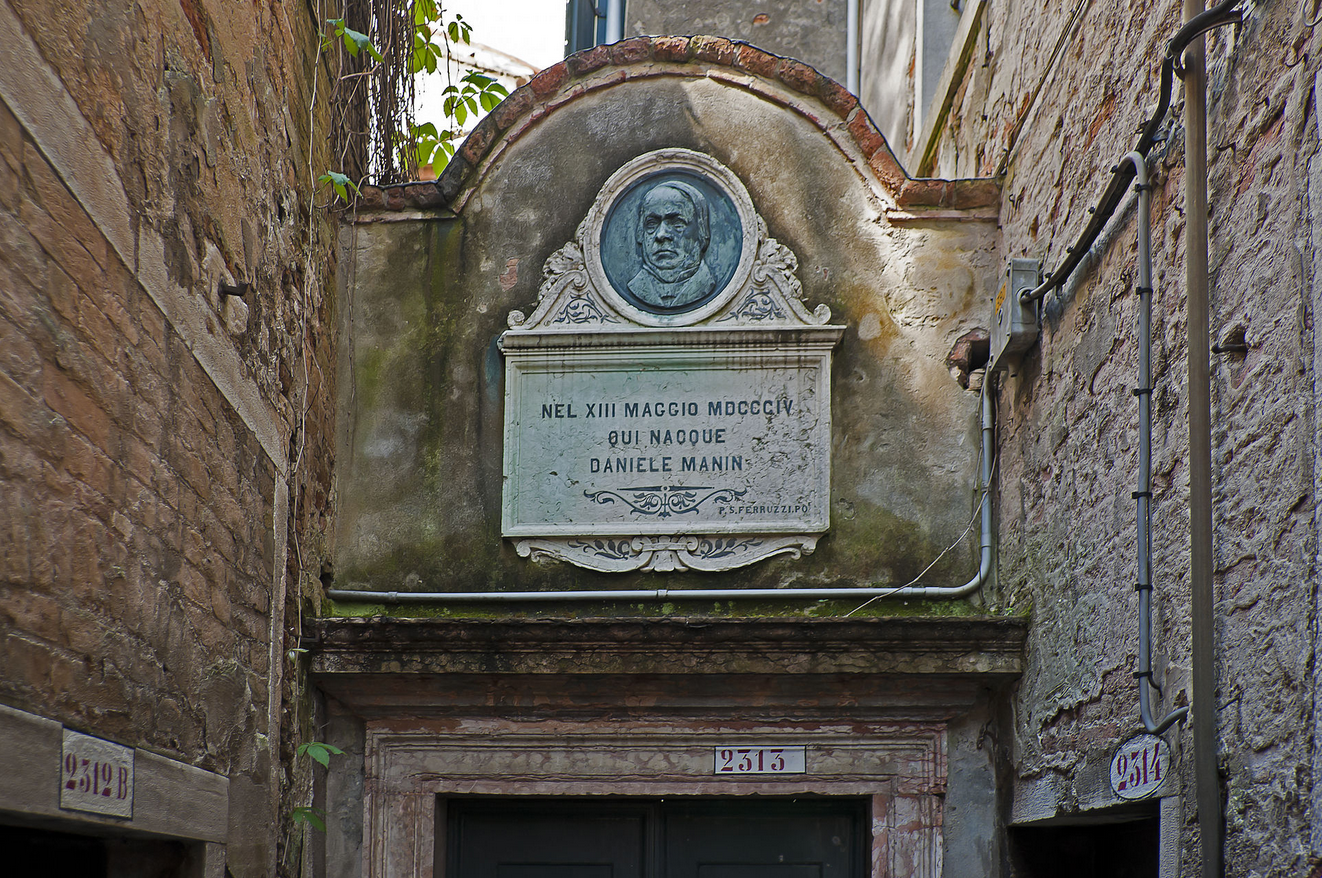
Born in 1804 Daniel Manin early showed a strong love of learning, which was eagerly tended by his father, a lawyer of some note. The father taught his son the history of his city, he brought him up to see the unjust practices of Napoleon and of Austria, he kindled in him the passion for liberty. The boy studied jurisprudence and the growth of Venetian dialects, at fifteen he translated the apocryphal book of Enoch from the Hebrew, at seventeen he became a Doctor of Laws, and had translated Pothier’s great French work on Roman law before he was twenty-one. The year he came of age he married, and a little later settled in the small town of Maestra, which lies at the entrance to the Lagoons, and started to practise his profession of advocate, which under Austrian rule allowed him only to act in civil cases, and then merely in a consulting capacity and never as a pleader in the courts.
Even in early youth his health was poor; although his mind was unusually active and well-balanced he was subject to frequent visitations of great physical weariness which at times made it impossible for him to accomplish anything. Later in life he wrote, “The act of living, in a healthy person, considered in itself, ought to be a pleasure; but to me from my very childhood, it has always been a painful effort. I always feel weary.” He was frequently morbid just at the time when his growing family required all his energy for support.
In person the young lawyer was rather striking, not tall, but spare, with unusually animated blue eyes, thick chestnut hair, and features full of changing expression, quick to show the temper of his mind. For all his underlying weariness and continued depression he often appeared gay and cheerful on the surface; it was his nature to be unselfish, and to turn a brave face towards the world.
Working as an advocate Manin gave up his spare hours to studying Venetian patois and to planning how in time his city might loosen the bonds of Austrian tyranny. As early as 1830, when he was only twenty-six, he joined with three close friends in a plot to seize the Venetian arsenal, and drew up a proclamation intended to excite the citizens. The movement throughout northern Italy on which the friends relied failed to materialize, and the plan fell through. Fortunately the authors of the proclamation were not discovered, and Manin was permitted to continue his profession. He did not believe in secret societies, and would not join them; he devoted himself to studying Austria’s colonial weaknesses.
The first step which brought him seriously to the notice of the government was his work on behalf of the Italian bankers who were associated with some Germans in building a railway between Venice and Milan. There had been a disagreement as to the route of the railway, and the Austrian viceroy had sided with the Germans. Manin was engaged to represent the Italian bankers, and conducted his side of the case with great skill. The Austrian government finally concluded the matter by arbitrarily dissolving the Italian Railways Association. The case had however shown Manin a possible mode of attacking the foreign despotism, finding flaws in its laws and concentrating on such weaknesses until eventually its whole fabric was loosened. He did not believe that any sudden local revolution could succeed, he saw only the loss of valuable lives thereby, but he did believe that the way for some later far-sweeping rising might be paved by consecutive breaches in the enemy’s legal walls. This opinion was the result of his evenly-balanced, deliberate judgment; he could at times, as he was to show later, throw himself passionately into a cause, without regard to consequences, but his nature was not that of the ardent revolutionary; he relied on cool, sober judgments, and was not readily led from them by illusions. In his notes we find him writing, “Against disorder I feel a repulsion not only of reason but of instinct, the same as I feel against everything contrary to the laws of harmony, a deformed face, a discordant sound.”
His advocacy of the Italian bankers brought Manin before the Venetian public, he was recognized as an able speaker with a deep knowledge of law. He spoke before the Venetian Athenæum on the obligation of thinkers to inspire and stimulate men of action. The subject gave him a chance to draw attention to the present lethargy of Venice and to urge consideration of new ideas affecting trade and commerce. He hoped to unite northern Italians through the new principle of free trade. Fortunately Cobden, the great English advocate of free trade, was traveling in Italy; he visited Venice and met Manin and some of the other Venetian leaders of opinion just as he had met Cavour at Turin and Massimo d’Azeglio at Genoa.
Various small events gave the lawyer a chance to speak publicly to his fellow-citizens. At the Scientific Congress which met in September, 1847, he was appointed a commissioner to investigate the charitable institutions of Venice, and in doing this work he came upon the case of a poor infirm workman who had placed a placard upon a public wall complaining that the government had left him to starve, and for which action had been placed in a lunatic asylum. Manin reported the case and wrote, “The physicians acknowledge the man is sane; but they dare not set him at liberty, fearing it would be contrary to the views of the police and government. For my part, I have a better opinion of the government and the police. I do not admit that they create madmen by decrees. If Padovini is culpable there are the laws.” Count Palffy, the Governor, was very much vexed. “We must release Padovini from the madhouse,” he said, “and put Manin in his place.”
About the same time Count Jablonski, a relation of the Venetian Governor, wrote a paper urging the Italians to become resigned. In reply Manin set down his thoughts in a page which seems to sum up his whole purpose, a wonderful expression of his philosophy. It was not published at that time, but was later found among his papers. It read:
“It is the fashion to preach resignation.
“I distinguish two kinds of resignation; the one virtuous and manly; the other cowardly, and worthy only of fools.
“The strong man, when overcome by misfortune, seeks the means of remedying it. Does he find any? In spite of difficulties, he applies himself to the task, excited, cheerful, and vigorous, full of energy and pertinacity. It is only when he is certain that no remedy exists, that he becomes resigned. This is manly resignation.
“The coward, when misfortune overtakes him, allows himself to be cast down, and seeks no means of remedying it. However spontaneous and easy relief may present itself to his mind, he attempts nothing, he wishes neither to trouble nor expose himself—he is resigned: this is the resignation of the fool.
“Therefore, resignation is virtuous and manly under evils manifestly without remedy; it is cowardly and stupid when we can in any way free ourselves from these evils.
“In the individual, resignation may often be virtuous; in a nation it is perhaps never so, for the misfortunes of a nation are seldom irremediable.
“To overcome the misfortunes of a nation, we can employ the whole intellectual, moral, and physical power of all its citizens; and if the generation which commences the generous task does not succeed in accomplishing it, other generations follow, who will attain success; for nations never die.
“This is the reason why those who advise resignation to nations, advise cowardice, and the nations which become resigned are cowards.”
Therein lies the whole wisdom of Manin’s political philosophy, and also that of many of the earlier Italian patriots. How could Austria hope to keep such men forever in subjection?
Manin’s avowed purpose was to show again and again that the Austrians were not obeying the laws which they had themselves given to the subject provinces. One of the methods of Austrian administrative rule was the use of supposedly representative councils called the Central and Provincial Congregations, which were designed to communicate the wishes of the people of Venice and Lombardy in the form of petitions to the Imperial council, and which had failed lamentably to use even that meager power. On December 9, 1847, Nazari, a deputy to the Lombard Congregation, moved that the grievances of the country be represented to the Imperial government. Not a single Venetian deputy followed his lead, but Manin, as a private individual, signed a petition to the Venetian Congregation calling upon them to speak for the people. His comments were brief but vigorous. “The Congregations,” he said, “have never been the interpreters of our wants or wishes—their silence has arisen from a fear of displeasing the government; but this fear is unjust, and injurious: for it is unjust and injurious to suppose that the government has granted to this kingdom a derisory national representation, that it deceived, and still deceives, this country and Europe, in making laws which it does not wish to be observed, and in prosecuting and punishing those who intend observing them.” The Venetians were delighted with the petition, they were beginning to feel the first thrills of a new civic life. On December 30, Manin and Tommaseo, a brilliant poet and public-spirited citizen, drew up another address which in bold terms denounced the Austrian censorship of the press contrary to a specific clause in the law of 1815. All the members of the Ateneo, the literary club of Venice, signed the petition that went with the address.
The Austrians failed to see in the unrest that appeared throughout Italy at the close of 1847 more than a series of local and widely-separated disturbances, and made small effort to appease any of the leaders. For their part in preparing the Venetian petition Manin and Tommaseo were arrested and thrown into prison on January 18, 1848, charged with high treason. The temper of the newly-aroused people was uncertain, on the morning after the arrest the streets of Venice were seen blossoming with signs ominous to peace and Austrian supremacy, “Viva l’Italia!” “Viva Manin e Tommaseo!” and “Morte ai Tedeschi!”
From the date of his imprisonment Manin underwent many sufferings, one of the chief being his inability longer to help in nursing a daughter to whom he was passionately devoted and who was suffering from a tedious and most painful nervous disease. At almost the same time his younger sister, who was ill in Trevisa, died from the shock of hearing of his imprisonment. He had been able to save very little for dark days, now that they were come he could do nothing to tide his little household through them. Outwardly he was calm and strong of will, inwardly he was tormented by a hundred fears. Yet he could write from prison to his brave wife, saying, “If you continue to be strong and courageous, these will be the happiest days of my life…. You will find a few pieces of gold in one drawer, a little silver in another…. If this affair lasts long, we must think of providing for you in some way. Love one another, my angels: be resigned, that is sufficient.”
A valiant attempt was made by Teresa Manin to secure her husband’s release on bail, the authorities put her off continually, and finally the Director-General replied that he did not believe himself authorized to accede to her request. This final reply caused an outburst of popular indignation. The Venetians dressed themselves in mourning, and with heads bared filed slowly before the windows of the prison on the Riva dei Schiavoni, where Manin and Tommaseo were confined. As long as he remained in prison the other advocates united in caring for Manin’s legal practice, and high-spirited friends among all classes insisted on providing his family with all necessities. He himself hoped to be able to support them by reprinting a small treatise on Venetian jurisprudence, but permission to advertise its sale was denied him by the government. A little later, however, Austrian permissions became no longer necessary, and Manin’s family lived on the proceeds of the sale of this work and on the small legacy left to him by his sister. He had little time to think of self-support when he became dictator.
The ancient spirit of Venice was slowly rising as day after day news came that men throughout Italy were turning on their despots. The Nicoletti and the Castellani, the two historic factions of the people, the blacks and the reds, renounced their ancient feud and took a common secret oath to war only with Austria until Venice was free. The young nobles resigned their Austrian offices and ranks, they had heard what the nobility of Milan were accomplishing. The examination into the charges against Manin and Tommaseo continued, although nothing illegal could be proved against them there was a prospect of their arbitrary removal out of Venice and to that prison of Spielberg where the careers of so many gifted Italian patriots had ended. Manin heard that the French had driven their King from his throne, he wondered what effect the growing tumult of that revolution year would have on Venice. He did not have to wait long to learn. The flames of revolt had spread across Europe even to Vienna, Metternich had fled from the city in peril of his life, the Austrian throne was tottering. Manin saw what was coming, and made his plans even while he was in prison to secure Venice against anarchy.
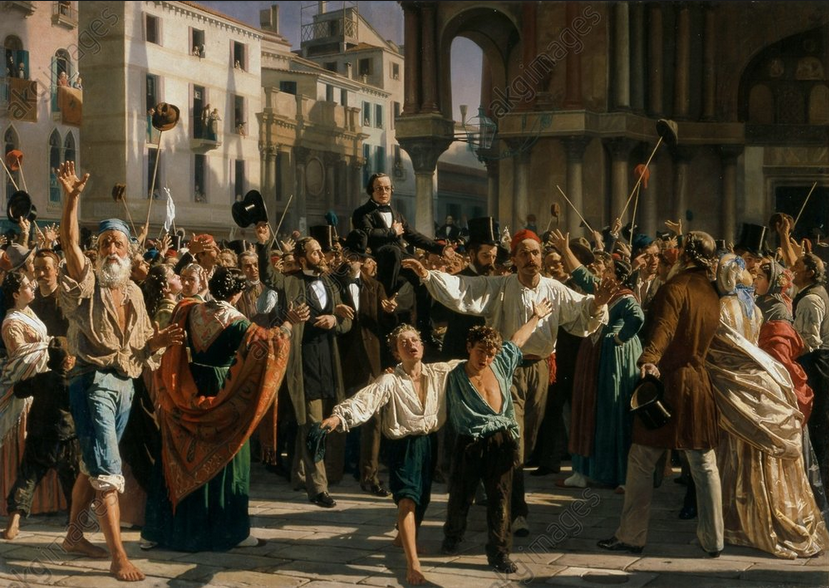
On the morning of March 17, 1848, the Venetians hastened to the dock to learn the latest news of Vienna from the Trieste packet. A French merchant on board called to the gondoliers the news, “A Constitution at Vienna! The Recognition of Italian Independence! A Free Press! A National Guard!” The words were sufficient, the people rushed to the Governor’s palace and demanded the immediate release of Manin and Tommaseo. The Governor wavered, declaimed, finally yielded, saying, “I do what I ought not to do.” The people swept to the prison, and beating down the doors, discovered the two captives. “You are free!” the leaders shouted. Manin still chose to follow the usage of law, and asked to see the warrant for his release. It was produced, and then he and his fellow captive were led forth from the dreary cells with loud acclaims of joy. Manin was raised in a chair, and so carried to the great Square of St. Mark’s, the scene of so many triumphs in Venetian history. The yellow and black flag of Austria had in some mysterious fashion fluttered down from the ancient flag-staves that guard the square and in its place floated the red, white, and green emblem. “Speak!” cried the people, and Manin, pale, infirm, and gaunt from prison life, rose and spoke with his remarkably persuasive voice. He said he did not know to what great events he owed his freedom, but could see clearly that nationality and patriotic fire had grown wonderfully during the past few months. “But forget not, I beg,” he implored, “that true and lasting liberty can only rest on order, and that you must make yourselves the emulous guardians of order if you would show that you are worthy to be free.” He paused a moment, then added, “Yet there are times pointed out to us by Providence when insurrection becomes not only a right, but a duty.”
Manin returned home, already intent on plans to regulate the new order of things. Towards night the great bell in the Ducal Chapel sounded the warning note, the people rushed to the Piazza to find a battalion of Croats tearing down the Italian tricolor, the people resisted, the soldiers cleared the square with a bayonet charge, but the Venetians had tasted triumph too fully to be dismayed. Some of them went to Manin and asked him to lead them against the Croats. “This is not the way,” he answered, “we must have a civic guard.” He sent a messenger to the Governor. “Tell him that to-day his life was in my hands, and that I preached order, not vengeance; and now, in the interest of his own life as well as of order, he must at once organize a civic guard.”
Again Count Palffy hesitated and put off the demand from day to day. He sent messengers to the Viceroy at Verona, and the latter telegraphed him permission to enroll two hundred citizens. Three thousand at once took arms and called on Manin to give them his commands. “Let all who will not absolutely obey me depart,” he said, but no one left. At last Venice again had an army of her own.
There was no immediate bloodshed. The leading citizens conferred as to what course Venice should take if the revolution in Vienna succeeded. Some were for joining the kingdom of Charles Albert, some for uniting with Lombardy, some for an Austrian ruler under a constitution. Manin scattered their diverse views, he told them that their immediate need was freedom, that their city must actually be in their own charge before considering her destiny. Rumors came that the city was about to be bombarded, there was danger both from the arsenal and from the sea, and on the night of March 21 Manin laid his plans before the chief patriots and told them that they must seize the arsenal. “The people of Venice,” he said, “can only understand one cry, ‘Let the Republic live!’” Still the others hesitated; one said, “The people are incapable of sacrifices!” “You do not know them,” cried Manin. “I know them; that is my sole merit, you will see!”
Newcomers arrived, and still Manin, worn with argument, pressed his opinion. He finished, saying, “We must have the Republic, and join with it Saint Mark. The Republic and Saint Mark will echo in Dalmatia.”
“Viva San Marco!” came an answering cry. “It is the only one, the rallying cry of Venice!”
The conference agreed; Manin sent for the commander-in-chief of the civic guard. “The city is threatened with bombardment,” he said. “I wish to take the arsenal at all hazards. You must make me commander-in-chief for a day. Form the six battalions into two brigades, and give me their captains for eight hours.” The general, astounded at the advocate’s demand, left without making a reply. Manin sent to the other commanders making the same demand. One by one they refused, claiming that the project was too wild.
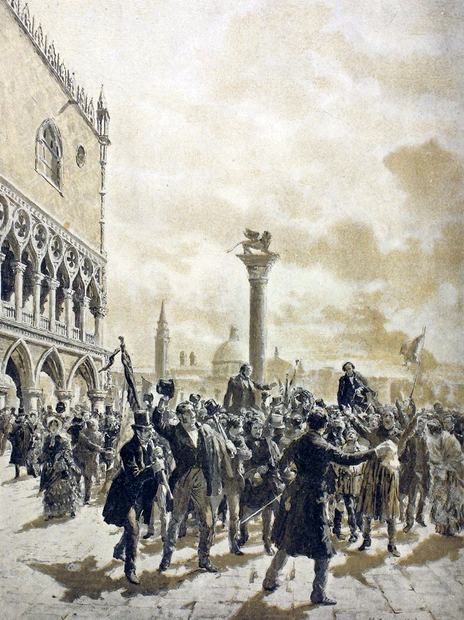
Meanwhile the soldiers at the arsenal were in mutiny and had killed the second officer in command; there was danger of the spirit of anarchy spreading. At the same time the last of the commanders, Major Olivieri, placed his single battalion at Manin’s command. The advocate seized his sword, called his son, a boy of sixteen, to follow him, and put himself at the head of the two hundred guards. The little band marched on the arsenal and forced the commander to surrender; almost before the Austrian officers knew what had happened the Venetians were distributing the military stores among the people. At the moment of taking the arsenal Manin had sent word to call the whole people into St. Mark’s Square. He found the ancient banner, the wingéd lion, and raising it from the dust where it had lain for fifty years he unfurled it before his company and led them back across the Piazzetta into the great square. He had told the people he would meet them there at noon; now he stood before them, bearing the emblem that proclaimed that Venice had risen from her lengthy slumbers. He spoke to the assembled city. “Venetians, we are free! And we are so without the shedding of blood, either our own, or our brothers’, for to me all men are brothers. But when the old government is overturned, the new must take its place; the best now seems to me to be the Republic which speaks of our past glory and adds the liberty of modern times. But by this we shall not separate from our Italian brothers, but rather form one of those centers destined to aid in fusing our Italy into one people. Live the Republic! Live liberty! Live Saint Mark!”
The civic guards swore to defend with their lives the new Republic and its founder, the aged wept, the young embraced, all raised their hands in gratitude to heaven. The people reveled in noble delirium of joy. Venice looked upon Manin as its deliverer; the citizens did not know the physical anguish he had undergone. Pathetic are the words of his little daughter Emilia as she heard her father proclaimed. “I ought,” she wrote, “to be filled with ineffable gladness, but a weight continually presses my heart.”
Manin had scarcely closed his eyes for five days and nights. As soon as the people would release him now he went home utterly exhausted: he said to his friends, “Leave me at least this night to rest, or I shall die.”
The Austrian authorities saw that resistance would be of little avail, their own forces were too small and too much in sympathy with the people’s cause to give them a sense of any real power on which to rely, and accordingly the Governor acceded to the terms imposed upon him. All foreign troops were to be removed, the forts and all military stores surrendered, the government transferred to the charge of a Committee of Venetian citizens. The demands were sweeping, the Austrian government later regarded the Venetian capitulation as the most humiliating they suffered in the revolutionary year of 1848.
That same night the provisional government announced to the people the terms of the Austrian capitulation, and the citizens were amazed to find that neither the name of Manin nor of Tommaseo was included in the new government. They made their dissatisfaction so apparent that friends went to see Manin to beg him to send some message to the people. He dictated the following lines from his bed: “Venetians! I know that you love me, and, in the name of that love, I ask you to conduct yourselves, during the legitimate manifestation of your joy, with that dignity which belongs to men worthy of being free. Your friend, Manin.”
The people heard the message and quietly dispersed. Next day the provisional government found that the new Republic would only have the one man at its head, and so they asked Manin to form a government. He did so immediately, taking for himself the Presidency of the Council and Foreign Affairs. He composed his government of men of different classes and different religions, all Venetians were assured of perfect equality in their new state. The patriarch blessed the standard of the Republic, and the commander of the fleet read the list of the ministry to the people. The reading was broken by constant cries of “Viva Manin! President of the Republic!”
Thus Venice became free after fifty years of bondage. It was now Manin’s concern to see that she was kept free. He recognized how slight were her resources, and he became at once an eager adherent of French intervention in northern Italy. Charles Albert of Piedmont and Mazzini were both acclaiming an Italy won by the Italians, but Manin foresaw, what Cavour was later to recognize, that foreign allies were absolutely essential.
France, however, was in a most unsettled condition, her ministers did not wish to see a strong state of upper Italy on their southern borders; they were already longing to annex Savoy, and yet as good republicans they felt themselves bound to aid the revolted states against Austrian tyranny. Manin made overtures for an alliance, at first merely feeling his way, but as the summer progressed, and the need grew more and more apparent, by definite overtures. The French Consul at Venice was most hopeful. He said to Manin, “It is well known that the sympathy of France, when she possesses liberty of action, is never without results.” In reply Manin said that he hoped “that the united efforts of the different Italian states, the ardor which animates the people of the Peninsula, will suffice to expel the enemy; if not, we shall have recourse to the generosity of France. Meanwhile, we should be glad to see at once some French vessels in the Adriatic, and I beg that you will lose no time in communicating our wishes to the foreign ministry.”
Manin wished to convene a popular assembly as soon after he assumed office as possible, and on June 3 such a deliberative body met, its members having been elected by universal suffrage from Venice and the free districts of the Dogado. Their first important task was to decide whether they would join with Lombardy in union under Piedmont’s King. Manin believed that the decision as to such a step ought to be deferred until the war was ended, but a strong party opposed his opinion. His partisans entered into a bitter fight with the opposition, for a time it looked as though the split in the Assembly would lead to civil war. Manin rose and implored those who were his friends to place no further obstacles in the path of fusion. Moved by his passionate appeal for harmony the Assembly passed the act of fusion with few negative votes, and at the same time resolved that “Daniel Manin had deserved well of his country.” He spoke again, saying, “While the foreigner is still in Italy, for God’s sake let there be no more talk of parties. When we are rid of him we will discuss these matters among ourselves as brothers. This is the only recompense I ask of you.”
The Assembly elected Manin head of the new ministry, but he declined on the ground that he had always been a republican and would feel out of place as a royal minister. In addition his health demanded that he seek some rest.
The new Venetian ministry lasted until August 7, when the Royal Commissioners assumed office. Unfortunately Charles Albert was already being beaten back in Lombardy, and on August 9 signed the armistice of Salasco, by which all claims to Venice were renounced. When word came to the city the Venetians were dumbfounded, then mad with indignation. Finally they rushed to Manin’s house, calling for him and denouncing the Royal Commissioners. Manin told the excited people that he would stake his head upon the Commissioners’ patriotism. He went to see them and then addressed the citizens again. “The day after tomorrow,” he said, “the Assembly will meet to appoint a new government. For these forty-eight hours I govern.” The people dispersed, satisfied now that their idol was at their head again. The Assembly when it met wished to make Manin dictator, but he pleaded his ignorance of military matters, and a triumvirate was formed, made up of Admiral Graziani, Colonel Cavedalis, and himself.
Just when it seemed as though France was finally deciding to come to the aid of northern Italy, England intervened and proposed a plan of joint mediation. To add to this obstacle Charles Albert declared that Italy would act for herself, and the chances of Venice winning a foreign ally were reduced to practically nothing. Italians from Naples to Piedmont were showing themselves to be individual heroes, but their efforts were ineffectual without a general leader. The Romans were hampered by the inaction of the Pope. Pius IX. had promised great things in the cause of national independence, but when the German Cardinals told him that in case he declared war against Austria he would forfeit their allegiance his enthusiasm waned. The Austrian general, Radetzky, was slowly winning back the fields lost in Lombardy, Vicenza fell, then Milan, and Austria felt herself strong enough to declare a blockade of Venice. As the summer of 1848 ended it became clear that Venice would be left to herself, that the tide of revolution in the other states was already ebbing, and that Piedmont had shot her bolt. Manin still hoped that some ally would succor the small city in her war against the great empire, but whether an ally should come or not he was determined that Venice should set an example of resistance that would show Europe how well freedom was deserved.
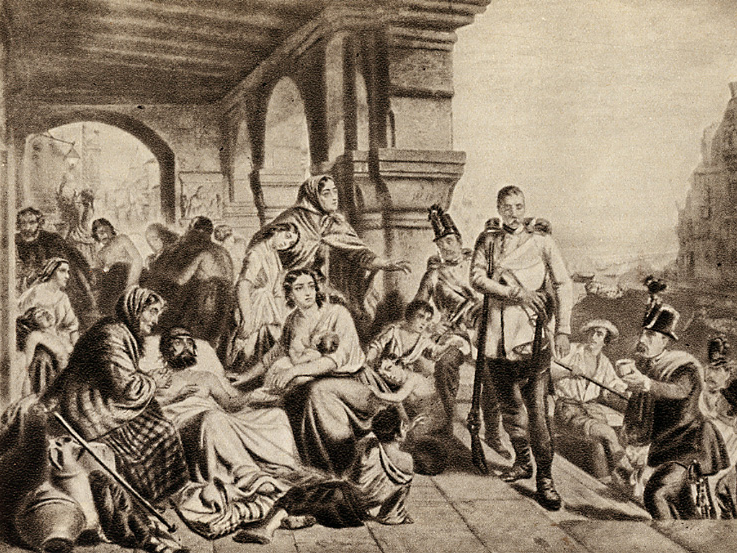
The city, in its state of siege, stood in the greatest need of money. Manin had only to ask, and all classes brought forth their savings, their heirlooms, whatever they had of value, to give to the cause. The old aristocracy, the boys in the street, every one who loved Venice, made their sacrifices gladly, reverently. Private citizens clothed many of the soldiers, palaces were given for public uses, Manin gave all his family plate and would accept no salary; General Pepe, the aged commander-in-chief, gave a picture by Leonardo da Vinci that was his dearest possession. No one thought of his own need, all thought solely of keeping Venice free. If she returned to bondage they cared little what became of them.
Ugo Bassi, the heroic priest who was later to fight with Mazzini on the walls of Rome, and still later to die at the hands of Austrian executioners, preached daily to the Venetians. There was no lack of noble spirits who recalled to them the great glories of the past. But above and beyond all the others the people loved Manin, they had come to link his name indissolubly with that of their city, he was their father, they his devoted children. If ever a man merited such devotion it was Manin. With the cares of his city weighing perpetually on his mind, planning, advising, encouraging, he fought the ravages of disease that crippled his resources, and spent the nights watching by the bedside of his sick child. At one time, in November, there was fear for his life, and Venice shook with apprehension. He recovered and took up the burden of government with his marvelous stoic calm.
In spite of the fact that the city was besieged and money scarce, Venice was characteristically buoyant. The theater, the Fenice, was crowded; fêtes and carnivals, always patriotically fervent, were of daily occurrence; processions, music, all that appealed to the eye and the ear and the imagination fed the Venetian love of glory. Their city was free, and the people awakened the echoes of that great life which had been theirs before captivity, they forgot so far as they could that they had ever slumbered. On the morning of November 17 Mass was celebrated in memory of all the martyrs to Italian liberty, and that same night the entire city was thrilled by a wonderful display of the Aurora Borealis which set the snow-caps of the Alps vividly before their eyes. They lived on faith, and hope, and trust in Daniel Manin, and found propitious omens with sea-dwellers’ skill.
In December some Roman volunteers left Venice to join their fellow citizens, and with them went Ugo Bassi. He bade Manin a touching farewell, foreseeing what lay before both his own city and Venice. He had venerated the Pope who had held out such noble hopes to all Italians, but he could do so no more, and in his place put the hero of Venice. As he left the city he kissed the stone plate on Manin’s door, saying, “Next to God and Italy, before the Pope—Manin.”
The Assembly which had voted for fusion with Piedmont was dissolved, and a new one elected. Manin was determined that his government should have the fullest power over the city. He deemed this essential to any hopes of ultimate success. Some members of the Assembly disagreed with him, and advocated restriction. “It is not a question of power,” replied Manin, “but of saving the country. If we are to be hampered on every turn by forms and limitations, we cannot act with the promptitude and vigor needful for the preservation of public order (I beg pardon of whoever the expression may offend), and our defense depends more upon that than upon the force of arms.”
The people got wind of the fact that certain of the Assembly were jealous of Manin’s power, and they marched to the Ducal Palace. Manin spoke and dispersed them, but again and again they gathered, making various demonstrations of their trust in him. At length he heard that they had devised a plan to march into the Council Hall and coerce the Deputies who wanted to fetter their “caro Manin.” Fearful of civic strife Manin called his son, and standing alone with him, sword in hand, at the door of the Palace, told the people that they could only enter after killing father and son. He bade them go quietly home, and they obeyed. That night he issued a proclamation. “Brothers, you have caused me great pain to-day. To show your affection for me you have risen in tumult, yet you know how I hate tumult … as you say you love me, I entreat you to show it by your actions…. To-morrow let there be no shouting, no meetings. Remain at home. Trust in the government and the Assembly, who regard your welfare as dearer to them than life.” He was always the father speaking to his children.
The Assembly listened to the advice of its wisest members, and abandoning all dissension, chose Manin as President of the Republic, giving him complete power both as to internal administration and as to relations with foreign states. Manin spoke in reply: “In accepting the charge which this Assembly has entrusted to me, I am conscious of committing an act of insensate boldness. I accept it. But in order that my good name, and, what is of more importance, your good name and that of Venice, may not be tarnished through this transaction, it behooves that I should be seconded and sustained in my arduous undertaking by your co-operation, confidence, and affection. We have been strong, respected, eulogized, up till now, because we have been united. I ask of you virtues which, if they are not romantic, are at all events of great practical utility. I ask of you patience, prudence, perseverance. With these, and with concord, love, and faith, all things are overcome.”
Charles Albert again took the field and for a brief interval the Austrians were repulsed. Brescia made a heroic stand, and the Venetians heard the news of the little city’s courage with shouts of acclamation and an added determination to fight Austria to the uttermost. The Venetian fleet was kept in constant readiness, the troops slept with their arms, there was only the one thought, to keep the lion-flag of St. Mark flying from the pili.
Then on March 28, 1849, came letters from Turin telling of the utter defeat of Novara and of Charles Albert’s abdication in favor of his son.
The first effect of the news on Venice was absolute stupefaction, then a wild rush to the Square of St. Mark’s. A tremendous crowd called, as usual in its troubles, for its “father, Manin!” Said a foreigner who was a witness of the scene, “The faith of Venice in this man was inconceivable, complete, and absolute. He had never deceived, never abused it. The people seemed to attribute to him omnipotence and omniscience, and believed him capable of guarding Venice from every peril, and of rescuing her from every calamity.”
The President appeared on the Palace balcony. He said that he had not yet received official confirmation of the news from Turin, but his sad expression and his few words showed his belief that the news might prove only too true. Venice passed a night of bitterest gloom, more hopeless even than in the later days when Austrian bombs exploded in the streets. Three similar days followed, and then came official confirmation of the news. Lombardy was Austrian once more.
The city withstood the shock, and took up its life of outward cheer and hope. On April 25, St. Mark’s Day, there was a grand festa, and Manin spoke. “Who holds out wins,” he declared. “We have held out, and we shall win. Long live St. Mark! This cry, that the seas rang with in old days, we must raise again. Europe looks on, and will praise. We must, we ought to win. To the Sea! To the Sea! To the Sea!” There was tremendous thrill in his magnetic voice, in his deep blue eyes, in the glow of his pallid face; Venice cried aloud with eager hope.
With this spring of 1849 came the great days. When the Assembly had voted to resist Austria at all costs, the people adopted a red ribbon as their emblem. A historian of that time says: “From the top of the Campanile of St. Mark, far above the domes, the roofs, and the spires of the palace and the basilica, beside the golden angel that seemed to watch over the city, they planted a huge red banner, which stood out like a spot of blood against the azure sky, which was seen by the enemy’s fleet afar off in the Adriatic, and by their army on the distant mainland. It defied them both, and announced to them that Venice would fight to the last drop of blood.”
Placards were fixed to every wall, at the corner of every street. They read: “Venice resists! Church plate, women’s golden ornaments, bronze bells, copper cooking utensils, the iron of the enemy’s cannon balls—all will be useful. Anything rather than the Croats!”
Night and day workmen had been building ships, now the little fleet fought through the lagunes as had the great fleets of the olden days. The land forces held the shore batteries, and these forces were composed of all the city. One artillery company, famous as the Bandiera-Moro, was made up of the patrician youth of Venice, who, with their ancient love of splendor, wore velvet tunics, gray scarves, and caps with plumes. When the bitter fight came at Fort Malghera they held their guns heroically, fresh men leaping to replace the dead, cheering for Venice as the bombs fell among them, firing and eating and carrying off the wounded under a devastating fusillade. Venice thirsted for glory, and she won it; there are no more stirring tales in history than that of the brief defense of the new-born Republic.
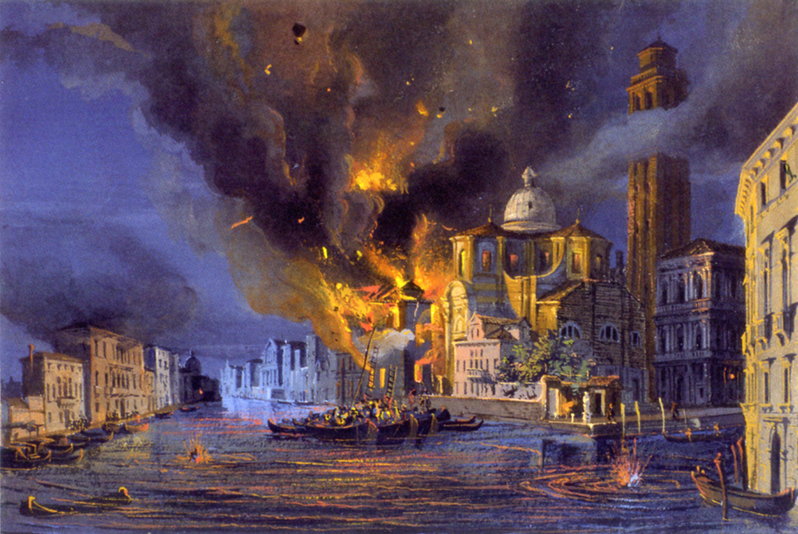
In July came continual bombardment, and with it cholera, and the seeds of sedition spread by Austrian spies. Manin feared civil dissension, he heard grumblers in the streets. No one dared accuse the man, whom the Assembly had chosen absolute dictator, of any wavering or treasonable thought, but some raised cries beneath his windows in the Piazzetta. The Dictator appeared suddenly before them. “Venetians,” he cried, “is this worthy of you? You are not the people, you are only an insignificant faction. Never will I accede to the caprices of a mob! My acts shall be guided solely by the representatives of the people, assembled in their Congress. I will always speak the truth to you, even should muskets be leveled at my breast, and daggers be pointed at my heart. And now go home, all of you—go home!”
His words swayed even that rebellious crowd, and they cheered him. For the time sedition was silent, but the people were losing hope. They were a mere handful battling with the forces of an empire. Manin saw that all he could do was to insure that his people died as heroes.
The city was the prey of famine, pestilence, and fire when on August 13 she held her last festa. The Dictator spoke to the troops in the Square of St. Mark’s. His words rang like a clarion call. “A people that have done and suffered as our people have done and suffered cannot die. The day shall come when a splendid destiny will be your guerdon. What time will bring that day? This rests with God. We have sown the good seed: it will take root in good soil…. If it be not ours to ward off these calamities, it is ours to maintain inviolate the honor of the city…. One single day that sees Venice not worthy of herself, and all that she has done will be lost and forgotten.” He asked them if they had still their confidence in him, if not he would resign the leadership to another. The Square shook with the thunder of the soldiers’ “Yes!” He went on: “Your indomitable love saddens me, and makes me feel yet more how this people suffer! On my mental and bodily faculties you must not count, but count always on my great, tender, undying affection. And come what may, say, ‘This man was misled:’ but do not ever say, ‘This man misled us.’ I have deceived no one. I have never spread illusions which were not my own. I have never said I hoped when I had no hope.”
As he finished speaking he staggered, and was barely able to get to the Council Chamber. There his physical weakness overmastered him. “Such a people,” he cried brokenly, “for such a people to be obliged to surrender!”
Nevertheless each hour now brought home the conviction that the strength of Venice was ebbing rapidly. Flames and the plague and the unremitting Austrian attack were bringing the proud city to her knees. Manin could only hope that he might at the last make honorable terms of surrender, he would not sacrifice all their heroic efforts to the desire for instant peace. On August 18 the people gathered in St. Mark’s Square, begging for some word of their President’s plans. He came out before them. “Venetians,” he said, “I have already told you frankly that our situation is a grave one, but if it be grave it is not desperate to the degree of reducing us to cowardice … it is an infamy to suppose that Venice would ask of me to do what was infamous; and if she should ask it this one sacrifice I would not make—even for Venice.”
Someone in the throng cried, “We are hungry!”
“Let him who is hungry stand forth!” answered Manin.
“None of us,” cried the devoted people. “We are Italians! Long live Manin!”
Five days later the city was torn by conflicting rumors of mutiny and surrender. Manin had not yet succeeded in winning the terms he wanted from the Austrians. When the people called for him he came out on the balcony as he had so often done before. He spoke a few words, and then a sudden pain seized him and he fell fainting into a chair. A little later he reappeared and cried to the cheering people, “Let those who are true Venetians patrol the city to-night with me.” Then he took his sword, and at the head of a great concourse, marched to the section of the city where the mutineers had gathered. Shots were fired. Manin stepped forward. “If you wish my life, take it!” he said. The mutineers were silenced.
The following day, August 24, 1849, the city capitulated, the stock of provisions having been absolutely exhausted that same day. The terms were honorable, such Venetian soldiers as had been in the Austrian service were to leave Venice. Forty civilians, headed by Manin, were to leave. The powers of government were temporarily lodged in the municipality.
That same day Manin left the Doge’s Palace for his own small house. All day the people passed before the door, saying, “Here lives our poor father! How much he has suffered for us!” He was too absolutely worn out to see any one. At midnight he with his wife and son and invalid small daughter went on board the French steamer Pluton. All but one of them were taking their last farewell of Venice.
The municipality, knowing that their great leader was penniless, had gathered a small sum of money and forced him to accept it before he left. He felt that the other exiles were in as great need of it as he, and so quietly distributed it among them through friends on the various ships that were bearing the exiles away. He had thought of the people as his children for so long a time that he had still to take the care of them upon himself.
The little family of four felt that it was farewell as they watched the palaces and churches, towers and pillars of the City of the Lagunes drop beneath the horizon. The view of Venice from the sea, incomparably beautiful, must have been unspeakably sad to Manin’s eyes.
When they arrived at Marseilles the devoted wife fell ill of cholera, and, worn out with the long siege, was powerless to resist. She had written on leaving Venice, “All is over, all is lost save honor! I am going to a foreign land, where I shall hear a language not my own. My beautiful language, I shall never hear it again; never more!” She died soon after reaching Marseilles.
Manin took his two children with him to Paris, and gave himself up to nursing the little girl, who was the victim of a continual nervous disorder. The daughter and father were united by a bond of love that was wonderfully strong and spiritual, they seemed to understand each other always without words. He kept a little note-book record of her illness as an aid to the physicians, and after his death the book was found with the touching inscription on the cover, “Alla mia Santa Martire.” Her desire to comfort her father sustained her for some years, she knew that she had become to him in a spiritual manner the living image of his unhappy country. She struggled with all the heroism of a remarkable character to hide her sufferings from him even as he sought to hide from her the anguish her illness caused him. Daniel and Emilia Manin were worthy to be father and daughter, both were heroic souls. In 1854 Emilia died, her last words, “My darling Venice, I shall never see you again!”
Manin and his son stayed on in the French capital, the father giving lessons in Italian for support. He had harbored no resentment against France for her failure to come to the aid of Venice, he felt that the French people were near kin to his own. He welcomed all Italians or sympathizers with Italy, he predicted that eventually the entire peninsula would be one in freedom. He met Cavour in Paris and talked long about Venice with him, he was gradually becoming convinced that Piedmont could and would lead the other states to victory. His study was hung with portraits of the most dissimilar characters, all one in interest for his country, Charles Albert opposite to Mazzini, Garibaldi opposite Gioberti, Montanelli near D’Azeglio. He wrote articles on Italy for the papers and traveled in England to arouse British interest in his cause. It was a great day when he saw the Italian tri-color flying beside the French and English flags to show that Piedmont had joined the allies in the Crimean war. “In serving under the tri-colored flag of Italian redemption,” he wrote, “the soldiers who fight in the Crimea are not the soldiers of the Piedmontese province, but the soldiers of Italy.” He understood the boldness of Cavour’s great diplomatic stroke and gave Piedmont the credit she deserved in becoming the first envoy of a great nation.
While his strength lasted Manin worked in the cause, but finally he was overcome by physical sufferings. He wrote in June, 1857, to his friend the Marquis Pallavicino, “A month’s rest in the country has not calmed the fever of my poor brain. All work, all meditation, is utterly impossible to me. Not only cannot I think about serious things, but I am not able to give my mind to the most unimportant matters. This will explain my silence. I lose patience and hope. My painful and useless life becomes intolerable. I ardently desire the end. Farewell.” The physical weariness with which he had battled all his life was at last overpowering him. He still believed that his principles would ultimately conquer, but knew that he should not see Venice freed. September 22, 1857, he died, at the age of fifty-three years.
August 30, 1849, Radetzky and the Austrians had entered Venice, replaced the Lion banner of St. Mark with the yellow and black flag of Austria, and had expected to see the pleasure-loving city sink back into its former quiescent indolence. What they expected did not come to pass. Instead for seventeen years Venice mourned its lost liberty and lived only in the thought of that day when it should rise again and finally. There was no shame in this subjection, no happy compromise. This was Manin’s achievement, he had made his people worthy to be free. That was the purpose of his heroic struggle, the lesson of his life.
July 5, 1866, the yellow and black flag of Austria fell from the pili, and October 18 of that same year the red, white, and green flag of united Italy greeted a free Venice. There was one wish in the people’s heart, that only their “dear father Manin” might have lived to see that glorious day.
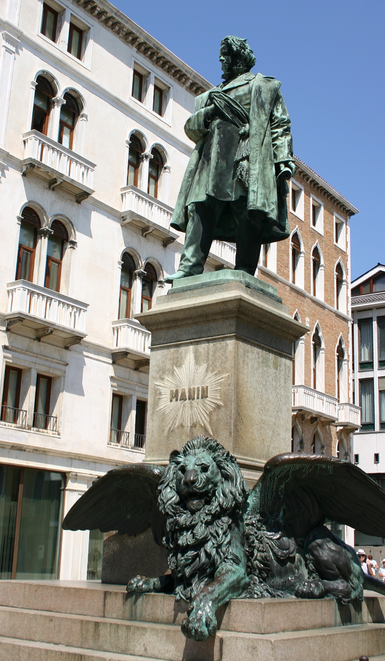
The remains of Manin, his wife and daughter, lie now close to the Church of St. Mark, his statue looks down upon the people in the square before his house even as he so often stood on the Palace balcony to speak to them in the days of 1849. All through Venice there are reminders of him, and he has taken his place among the great heroes of that historic city—himself her greatest hero, her sincerest patriot. The simple advocate, the great President, the “dear father” of the Venetian people.

